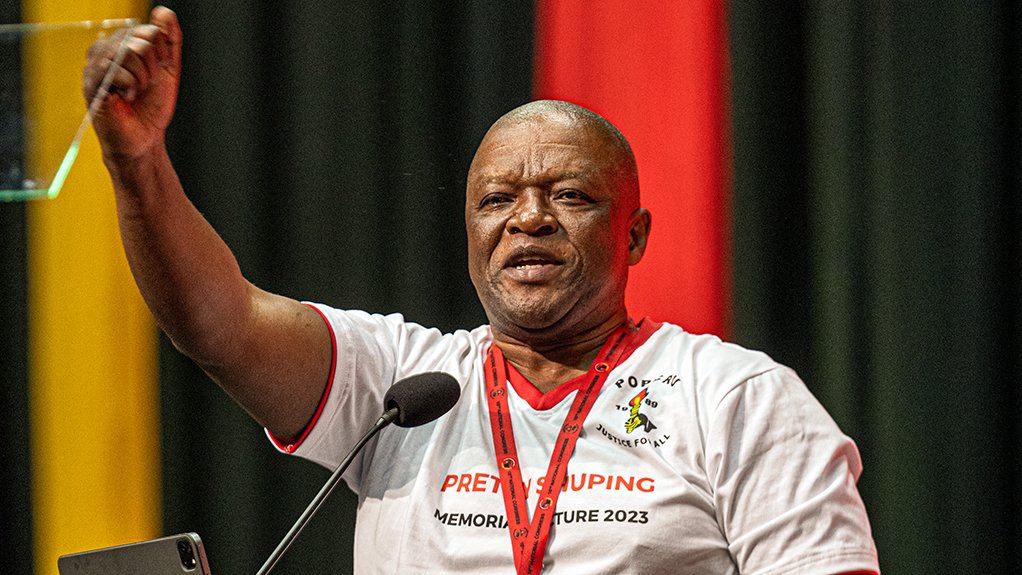/ MEDIA STATEMENT / The content on this page is not written by Polity.org.za, but is supplied by third parties. This content does not constitute news reporting by Polity.org.za.
The former President of the Police and Civil Rights Union (POPCRU), Dr Cebekhulu-Makhaza, has delivered a stern criticism to leaders and policymakers in the criminal justice cluster for underutilising graduates and academic research, warning that this oversight is inhibiting the fight against crime.
This followed an in-depth panel discussion on promoting the role of education in professionalising the criminal justice cluster, which was held at a recent special honorary event for Dr Cebekhulu-Makhaza in Johannesburg.
Facilitated by Dr J. J. Tabane, the panel discussion was joined by Dr Alex Mahapa, the Deputy Director General of the Department of Public Service and Administration; Dr Phil Vuma, the Head of Research in the South African Police Service; Professor Kholofelo Rakubu, a criminologist and the Head of the Department of Safety and Security Management at Tshwane University of Technology; and Dr Cebekhulu-Makhaza as the former President of POPCRU who led the union for 27 years.
As a strong proponent for education, Dr Cebekhulu-Makhaza is busy working towards a second Doctorate of Philosophy (PhD) in criminal justice and corrections, adding to an already impressive repertoire that includes two master's degrees and a bachelor’s degree.
In response to the issues raised by the panel, Dr Cebekhulu-Makhaza highlighted problematic silos within the criminal justice cluster, the failure to effectively utilise academic research, and the failure to promote or recruit graduates into police, traffic, and correctional service ranks.
“Why are we not integrating key researchers and graduates into the criminal justice system? By doing things the same way in which they have always been done, we can only expect the same results – which means, unfortunately, that we will never win the fight against crime, especially as criminals themselves evolve and become smarter,” he said.
“Our nation is home to a wealth of intellectual capital, with numerous graduates in the fields of criminology, law and criminal justice law, sociology, forensic investigations and forensic analysis, chemistry, and other relevant disciplines. These individuals possess the latest knowledge and innovative ideas that could significantly enhance our criminal justice policies. However, their potential remains untapped due to the lack of formal structures to integrate their expertise into law enforcement services or utilise them within management and policymaking processes.”
Dr Cebekhulu-Makhaza called on policymakers to take decisive action to correct the oversight and ensure that graduates with enhanced skills and training were not cast aside or marginalised within the criminal justice sector.
Likewise, he noted that policymakers and law enforcement agencies should seek to open communication channels and dialogue with academics and researchers to better understand the criminal landscape, and to guide their strategies and decision-making.
“Evidence-based policies that are grounded in academic research are far more effective than impulsive plans based on anecdotal evidence or political rhetoric.
“Moreover, academic research could contribute to the evaluation of existing policies and practices within the criminal justice system. It would allow for the assessment of the effectiveness of laws, regulations, and interventions in reducing crime rates and improving public safety. This feedback loop is essential for continuous improvement and adaptation in the face of changing crime patterns.”
As an example, he pointed to the success of the Policing Indaba held in August, an initiative spearheaded by POPCRU to discuss ongoing obstacles in law enforcement, and find effective solutions to high crime levels. The indaba was attended by participants from diverse fields, including academics and researchers, resulting in outcomes such as the call to overhaul and modernise the outdated Criminal Procedure Act 51 of 1977, harness new technologies, and address issues with the country’s crime statistics reporting.
“The Policing Indaba set the tone for our drive to utilise graduates and the inputs of researchers and academics within the criminal justice system. It led us to ask why these resources are being ignored as we seek to improve policing procedures and address other important aspects to bring a halt to rising crime and corruption rates,” explained Dr Cebekhulu-Makhaza.
“We must harness the untapped power of academics, researchers, and the graduates of our learning institutions to better focus our efforts, hone our efficiency, and strengthen the reputation and professionalism of our agencies as the guardians of law and order in our country.”
POPCRU has been driving the narrative of synergy within the criminal justice system, and urging the breakdown of silos to holistically address ongoing issues and inhibitors in the fight against crime. According to Dr Cebekhulu-Makhaza, incorporating the inputs of graduates, academic researchers and institutions is critical in this regard.
“We are calling on lawmakers and ministers to empower our institutions and services with greater emphasis on education, and to embrace academic research as the foundation to formulate effective strategies and policies to address crime and ensure public safety.
“It is time to move beyond words, and to take the decisive action needed to harness the transformative potential of our graduates and academic research,” he concluded.
Issued by former President of the Police and Civil Rights Union (POPCRU), Dr Cebekhulu-Makhaza
EMAIL THIS ARTICLE SAVE THIS ARTICLE ARTICLE ENQUIRY
To subscribe email subscriptions@creamermedia.co.za or click here
To advertise email advertising@creamermedia.co.za or click here











